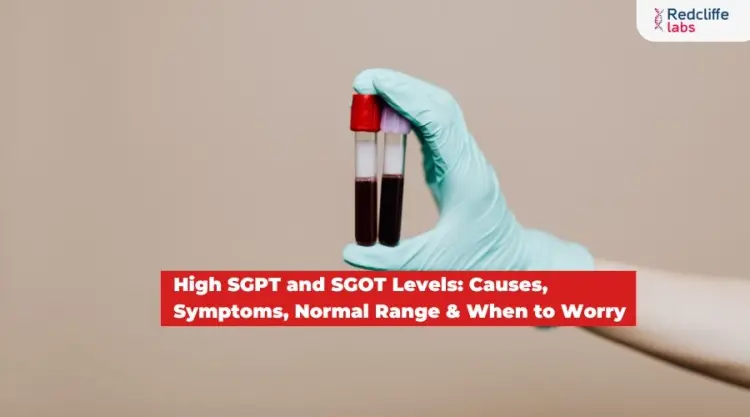Blood
Unlock special
discount on
this package
Login to Unlock 🔓
Also Known As
Bilirubin Blood Test, Total Bilirubin Test, Direct Bilirubin Test, Indirect Bilirubin Test, Serum Bilirubin TestNABL Accredited lab*

Booking Benefits Unlocked Worth FREE 799

Report Consultation

Diet Plan
*Available once your report is generated.
At Redcliffe Labs, we have a single goal: to give India its right to quality diagnostics.
Customers served
Tests Processed Everyday
Cities
Collection Centres
World Class In-house Labs
Home Collection Experts
1 Test Parameters
Bilirubin (Total, Direct & Indirect)
1 PARAMETER INCLUDED
1 PARAMETER INCLUDED
- Bilirubin (Total, Direct & Indirect)
Helps you know your test better
Who should take the Bilirubin Test?
- Anyone suspected to have symptoms of jaundice, anemia, a history of heavy drinking, or cirrhosis should take the Bilirubin Test to measure their levels and diagnose the cause.
Why take the Bilirubin Test?
- Your doctor may suggest you take the bilirubin test when you have symptoms of high bilirubin levels in the blood. Other than that, the test may also be recommended to individuals showing signs and symptoms of: -
- Bile duct blockage
- Jaundice
- Hemolytic anemia
- Liver disease/damage
What are the benefits of the Bilirubin Test?
- Measure bilirubin levels in the blood.
- Diagnose jaundice, hepatitis, and other liver disease or damage.
- Help evaluate liver functions.
- Monitor the progress of the disease and treatment efficacy.
Top Booked Health Checkup Packages
Reports in 12 hours
|Parameters 94
Reports in 12 hours
|Parameters 96
Reports in 12 hours
|Parameters 89
Reports in 12 hours
|Parameters 96
Reports in 12 hours
|Parameters 90
Helps you know your test better
Q. How can I book my test?
Q. In how much time will I get my test reports?
Q. Where can I see or get my test results?
Q. Is home sample collection available for the Bilirubin Test?
Verified by Medical Expert

WRITTEN BY
Sheena Mehta

MEDICALLY REVIEWED BY
Dr. Pradeep Lodha
Table of Content
Introduction To the Bilirubin
Bilirubin is a yellow pigment produced from the breakdown of hemoglobin in aged red blood cells. The bilirubin blood test measures Bilirubin levels in the blood. Bilirubin is found in bile, a fluid produced by the liver. It is stored in the gallbladder and plays a role in the digestion of food. The liver processes bilirubin, and abnormal levels may indicate liver or bile duct problems. The bilirubin test evaluates total bilirubin as well as its two forms: direct (conjugated) and indirect (unconjugated) bilirubin.
Doctors may recommend the bilirubin test to diagnose and monitor liver diseases like hepatitis or cirrhosis. The test also detects bile duct obstructions or gallbladder issues. Monitoring bilirubin levels is vital to understanding liver function and RBC (red blood cell). However, early detection of abnormal bilirubin levels can help prevent severe disease complications, such as chronic liver disease or brain damage in newborns.
However, if you notice symptoms such as jaundice (yellowing of the skin or eyes), dark urine, or pale stools, it might be due to liver health issues. Consult your doctor and take the bilirubin test from Redcliffe Labs. The healthcare professional here will provide you with the best diagnostic services. You just need to book your home sample collection, and the phlebotomist will come to your location for a sample collection. The reports are also available on time, and 100% report correctness is guaranteed. Book your Bilirubin Test Today!
Test details in brief
| Also Known As | Total Serum Bilirubin, Conjugated Bilirubin, Unconjugated Bilirubin, Indirect Bilirubin, TSB Total Bilirubin, Direct Bilirubin, TBIL Neonatal Bilirubin, |
| Purpose It measures | It assesses liver health, diagnoses jaundice & liver disease, & helps monitor treatment progress. |
| Preparation | Do not take any over-the-counter medicine without confirming with your Doctor. |
| Fasting | Fasting Not Required |
| Get Reports | Within 12 hours |
| Cost | ₹199 |
Purpose of the Bilirubin Test
The doctors may order the bilirubin test and other blood tests like a comprehensive metabolic panel, a liver panel, or a urinalysis. Here is what the bilirubin test helps-
- Bilirubin blood tests help doctors diagnose liver-related problems. One of them is jaundice, a condition that may cause eyes and skin to turn yellow and may also lead to severe health complications such as hepatitis, gallbladder disease, cirrhosis, and hemolytic anemia.
- Bilirubin blood testing is also used to diagnose neonatal jaundice, which can lead to kernicterus at very high bilirubin levels.
- Evaluates the cause of jaundice by measuring bilirubin levels in the blood.
- The test helps detect blockages in the bile ducts due to gallstones, tumors, or infections.
- It helps to determine if excessive red blood cell breakdown (hemolysis) contributes to abnormal bilirubin levels.
What does the Bilirubin Test measure?
The bilirubin blood test measures the total bilirubin amount in the blood. Here is what the bilirubin test measures-
- Total Bilirubin- The overall amount of bilirubin in the blood, including both direct and indirect forms.
- Direct (Conjugated) Bilirubin is bilirubin processed by the liver and ready to be excreted through bile into the digestive system.
- Indirect (Unconjugated) Bilirubin is bilirubin that the liver still needs to process. High indirect bilirubin levels may indicate increased red blood cell breakdown or liver dysfunction.
An abnormal bilirubin level can indicate liver problems, bile duct obstructions, or hemolytic conditions. Elevated bilirubin suggests issues with bile excretion, and high indirect bilirubin indicates liver dysfunction or excessive red blood cell breakdown.
What is the Role of Bilirubin Total, Direct Bilirubin, and Indirect Bilirubin?
A bilirubin test measures Total Bilirubin, direct bilirubin, and indirect bilirubin to assess liver health and diagnose conditions such as jaundice. It helps in the breakdown, processing, and excretion of red blood cells in the body.
- Total Bilirubin- The Total Bilirubin measures the total amount of bilirubin in the blood. It is the sum of direct and indirect bilirubin levels. High total bilirubin can indicate issues such as liver disease, bile duct obstruction, or excessive red blood cell breakdown (hemolysis).
- Direct bilirubin—This test measures the amount of bilirubin bound to proteins in the blood. Direct bilirubin is the form of bilirubin that has been processed by the liver and conjugated (bound to glucuronic acid), making it water-soluble. The liver easily excretes this form into the bile and then into the intestines through the bile ducts. High levels of direct bilirubin can indicate liver dysfunction, such as hepatitis, cirrhosis, or bile duct obstruction, which prevents the excretion of bilirubin.
- Indirect Bilirubin- Measures the amount of Bilirubin in the blood that's not associated with proteins. Indirect bilirubin is the form of bilirubin that has not yet been processed by the liver and is not water-soluble. It results from the breakdown of hemoglobin from old or damaged red blood cells. The unconjugated bilirubin is then transported to the liver, where it is conjugated and made water-soluble. High indirect bilirubin levels can suggest hemolysis (excessive red blood cell breakdown) due to conditions like anemia, sickle cell disease, or certain hemolytic disorders.
Preparation Required for the Bilirubin Test
You need to do no specific requirements or preparations before the bilirubin test. Follow the simple instructions mentioned below-
- Fasting- You do not need to fast before the bilirubin test. You can eat and drink normally.
- Medications—Many medications may interfere with bilirubin test results. So it is important to tell your doctor about any medicines you take. Your doctor can advise you whether to take your medications.
- Hydration- Keep yourself calm and hydrated.
However, if you have any doubts about the test, consult your healthcare provider. They can answer all your questions.
The procedure of the Bilirubin Test
The bilirubin test is a blood test. The sample will be taken from the vein of your arm. Here is the complete step-by-step process of the bilirubin test-
- The healthcare professional will clean the arm area with an antiseptic solution.
- He will tie a tourniquet or elastic band on the arm area to make the veins more visible.
- After that, he will insert a sterile needle into the arm to collect the blood sample, which he will then transfer to a vial or test tube.
- The needle is removed carefully, and a bandage or cotton gauze is applied to the puncture site to stop bleeding.
- The blood sample is then sent to a lab, where bilirubin levels, including total, direct, and indirect bilirubin, are measured.
Results are available within 12 hours. Your doctor will explain the findings and recommend further tests or treatment.
What do the Bilirubin Test reports indicate?
The bilirubin test results provide valuable insights into liver health, bile duct functionality, and red blood cell breakdown. Here's what the reports indicate-
Bilirubin Normal Range-
- Total Bilirubin: 0.3–1.2 mg/dL
- Direct (Conjugated) Bilirubin: 0.1–0.4 mg/dL
- Indirect (Unconjugated) Bilirubin: 0.2–0.8 mg/dL
Normal levels suggest that the liver and bile ducts function correctly, and there is no excessive red blood cell breakdown.
High Direct Bilirubin
The test may indicate issues with bile excretion, such as,
- Bile duct obstruction (e.g., gallstones or tumors).
- Liver diseases like hepatitis or cirrhosis.
- Cholestasis (reduced bile flow).
High Indirect Bilirubin means
- Increased red blood cell breakdown (e.g., hemolytic anemia).
- Liver's inability to process bilirubin properly (e.g., Gilbert’s syndrome).
Impact on newborns- High bilirubin levels in newborns indicate jaundice, which, if untreated, may lead to complications like kernicterus (brain damage).
Infants generally have higher bilirubin levels in the blood after birth as the liver continues to develop. However, if you are concerned about your baby's bilirubin levels or your baby is showing signs of jaundice, consult your healthcare expert.
Always consult your doctor to understand your bilirubin levels. The test results may vary based on age, medical history, and overall health.
Who should take the Bilirubin Test?
The bilirubin test is recommended for people experiencing symptoms or conditions that may indicate liver, bile duct, or red blood cell issues. This includes:
- People with symptoms of jaundice
- Patients with Liver health issues
- People experiencing symptoms like fatigue, abdominal pain or weight loss
- People with Gallbladder or Bile Duct Issues
- People with blood disorders
- Newborns
The bilirubin test detects abnormal levels, which can help diagnose and manage conditions before they become serious. If you notice any symptoms or have a family history of liver disease or bile-related disorders, consult your doctor.
What are the common symptoms related to liver disease?
Liver diseases can manifest through various symptoms and may indicate health issues. Common symptoms include:
- Jaundice (yellowing of the skin and eyes)
- Fatigue and Weakness
- Abdominal Pain and Swelling
- Dark-Colored Urine
- Urine that appears tea-colored
- Pale or Clay-Colored Stools
- Nausea and Vomiting
- Swelling in Legs and Ankles
- Edema or fluid retention in lower extremities.
- Easy Bruising or Bleeding
- Itchy Skin
- Mental Confusion
If you experience any of these symptoms, consult a healthcare provider promptly. Early diagnosis and treatment of liver-related disease can prevent severe complications.
What causes High Bilirubin Levels?
High Bilirubin levels are a condition called hyperbilirubinemia, which occurs when there is an issue with the body's production, processing, or elimination of bilirubin. Here are the common causes of high bilirubin levels-
Liver-Related Conditions
- Hepatitis is a condition related to liver inflammation in which the liver reduces its ability to process bilirubin.
- Cirrhosis: A condition of permanent scarring that damages your liver and interferes with its functioning.
- Liver Failure: Advanced liver diseases may lead to high bilirubin levels.
Gallbladder or Bile Duct Issues
- Gallstones: These block the bile ducts and may prevent bilirubin excretion.
- Cholecystitis: Inflammation of the gallbladder affects bile flow.
- Bile Duct Tumors: Obstructions in the bile duct system can elevate bilirubin.
Blood Disorders
- Hemolytic Anemia is when the excessive breakdown of red blood cells increases bilirubin production.
- Sickle Cell Anemia: A blood disorder when abnormal red blood cell destruction causes elevated bilirubin levels.
Genetic Disorders:
- Gilbert’s Syndrome: A common, mild condition that affects bilirubin metabolism.
- Crigler-Najjar Syndrome: A rare genetic disorder causing severe hyperbilirubinemia.
Newborn Jaundice
- High bilirubin levels in newborns occur due to their immature liver not processing bilirubin efficiently.
Other Causes:
- Infections: Such as sepsis or malaria.
- Alcohol Consumption: Excessive drinking damages the liver.
- Certain Medications: Drugs that affect liver function or increase red blood cell destruction.
Bilirubin Test price at Redcliffe Labs
Download the Redcliffe Labs app or book your Bilirubin test online for the best discount and offer. The Bilirubin Test cost at Redcliffe Labs is INR 199. We offer a wide range of diagnostic tests, from genetics to general tests; we have more than 3600 tests available. Our services are accessible across PAN India in more than 220 cities, with 80+ labs and 2000+ collection centers offering home sample collection services.
All our labs follow the highest quality standards and guidelines. We ensure multiple quality checks across all touchpoints throughout the customer lifecycle. More than 50,000 doctors trust us. You can get the best discounts and offers on diagnostic tests. All you need to do is book your appointment with us.

5 Simple Steps to Manage Your Health with Redcliffe Labs
Quick, Simple & Convenient; trusted care delivered to your doorstep.

Start Your Online Booking
Open the Redcliffe Labs website/app. Select the test or package and enter your details. Schedule the service for your preferred slot.

Live Tracking
Stay updated with real-time tracking for a smooth and timely home sample collection.

Sample Collection
Our certified experts ensure a smooth, hygienic, and fully compliant sample collection experience.

Doctor-Verified Smart Reports
Every report is clinically checked by expert doctors and shared with smart, actionable insights.

Your Health Journey Continues Post Reports
Consult with our expert medical team to get actionable insights to improve your health.
Nearby Labs(9)
Redcliffe Labs Noida

MC-5280
Redcliffe Collection Center
Redcliffe Collection Center
Redcliffe Collection Center
Redcliffe Collection Center
Redcliffe Collection Center
Redcliffe Collection Center
Redcliffe Collection Center
Redcliffe Collection Center
Frequently Asked Questions
What is a bilirubin total, direct, and indirect test?
Why is the bilirubin test important?
What is the normal range for total, direct, and indirect bilirubin?
How is the total bilirubin test, as well as the direct and indirect tests, performed?
What can cause high total bilirubin levels?
Do I need to fast before a bilirubin test?
What are the symptoms of high bilirubin levels?
Is jaundice related to bilirubin levels?
How long does it take to get results from a bilirubin test?
Can medications affect bilirubin levels?
What should I do if my bilirubin levels are abnormal?
Is a bilirubin test used to assess liver function?
Can I book a Bilirubin (Total, Direct & Indirect) Test near me?
Can I book a home collection for a Bilirubin (Total, Direct & Indirect) Test?
Health Articles & Blogs
My Health
Stay informed with our expert health articles and blogs. Explore comprehensive guides on diseases, nutrition, preventive care, and wellness tips to help you make better health decisions.
Why is PCOS Continuously Rising in Women?

10 Healthy Holi Recipes for Your Fitness Goals in 2026
Looking for healthy Holi recipes? Discover 10 festive dishes that support your fitness goals while keeping celebrations delicious.

Importance of Heart Health Before Pregnancy: Everything You Need to Know

Migraine Treatment at Home: Effective Ways to Relieve Migraines Naturally

High SGPT and SGOT Levels: Causes, Symptoms, Normal Range & When to Worry

Brain Hemorrhage Symptoms: Early Warning Signs, Types, Causes & When to Seek Emergency Care

What is SGPT in Blood Reports? Everything You Need to Know

Capsicum (Shimla Mirch) 101: Benefits, Nutritional Value, Uses and More
Explore My Health
